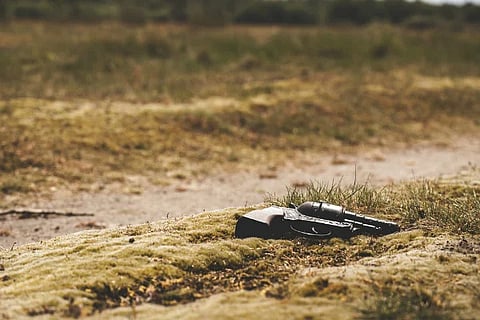

Six Maoists are likely to surrender before the Karnataka government in an undisclosed location on Wednesday, January 8, following consultations with the surrender committee. The surrender of the six, which includes two from other states, is likely to bring an end to the Maoist movement in Karnataka.
Chief Minister Siddaramaiah had on Monday, January 5, told reporters that he had given a call to Maoists to surrender. “The process of bringing them into the mainstream is underway,” he said.
Writer Banjagere Jayaprakash, one of the surrender committee’s three civil society members, told TNM that six Maoists had expressed a desire to surrender. Although he declined to mention when it would occur, sources said they are likely to surrender on January 8 in Chikkamagalur district in the presence of the Superintendent of Police and the Deputy Commissioner.
Jayaprakash said that the Maoists had written a letter to the civil society members of the committee four days ago and expressed a desire to “give up arms and join the mainstream”. The Maoists did not use the word “surrender” throughout the letter, he added.
“They said that it was no longer possible to carry out an armed struggle and that they have decided to join the mainstream. They have said that they would continue their struggle for farmers’ rights and other issues in a Constitutional manner. They have also sought an assurance from the government that the relief package would be implemented,” Jayaprakash said.
In the letter, the Maoists also sought assurances from the government that the Kasturirangan report would not be implemented and that tribal people who had encroached on small tracts of land such as an acre or so would not be evicted. They also urged the government to provide basic amenities to the people living in the forests, Jayaprakash said.
Parvatheesha Bilidale, another civil society member of the committee, told TNM that of the very few personal demands they made, the main one was help for health issues. “These demands can be looked into immediately, but other policy related demands will take time to implement,” he said.
On the cases registered against them, Parvatheesha said, “There is no question of withdrawing the cases. However, the issue of how the court proceedings could be simplified has been discussed in the committee.”
The three civil society members of the state committee to oversee Naxal surrender and rehabilitation have attempted to bring Maoists to the mainstream since January 2024, when they were appointed.
Jayaprakash said that during the past year, they had given a call to Maoists to give up arms, by holding press conferences and leaving letters and their phone numbers with people who lived in areas where Maoist presence was suspected. In November, before the encounter killing of tribal man and Maoist Vikram Gowda, Maoists had reached out indirectly to the three committee members regarding surrendering, Jayaprakash said. However, 15 days ago, the process picked up again, with a clearer outline of surrender.
According to sources, the government has assured the Maoists that once they give up arms, they would not be obstructed from carrying out any activity that is lawfully done. The government has also assured that it would make efforts to club all the cases at a single court in order to speed up the legal proceedings and complete them in a time-bound manner.
The state government has also assured them that the financial aid would be disbursed in three instalments according to the revised policy, which provides for Rs 7.5 lakh assistance for Category A Maoists (cadres who are residents of Karnataka), and Rs 4 lakh for category B (cadre from other states). Financial aid would also be provided in case they provided information that helped in the recovery of arms and ammunition.
Jayaprakash said that as two of the Maoists are from other states, the committee would take a decision on the modalities of implementing the rehabilitation package for them, adding, “The committee will decide on these details after they surrender.”
The encounter killing of Vikram Gowda
According to sources, the Maoists had asked the government for an inquiry into the extrajudicial murder of Vikram Gowda, to which the government replied that an inquiry was being conducted.
There was public outrage over the encounter killing of Vikram Gowda, a tribal man who had become a Maoist, on November 18 last year in Peetabail village of Hebri taluk, Udupi district. An independent fact-finding team that visited the site of the encounter and the neighbouring villages found inconsistencies in the claims of the police as narrated in the FIR.
While the government had initiated a departmental inquiry, Jayaprakash said that the three civil society members would continue to demand a judicial inquiry into Vikram Gowda’s encounter killing.